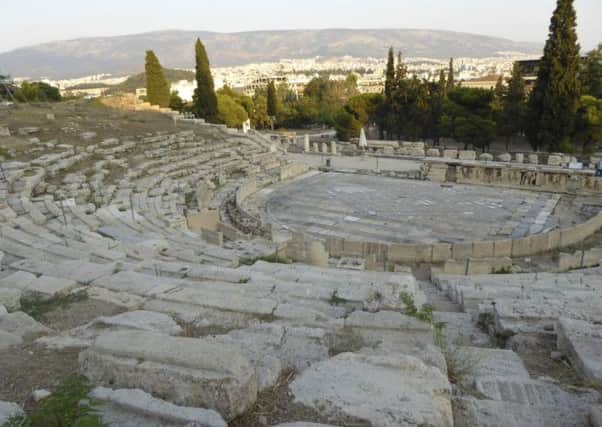Book review: The Goddess Of Buttercups And Daisies


The Goddess Of Buttercups And Daises
Martin Millar
Piatkus, £8.99
MARTIN Millar one of the most serendipitous careers of any contem-porary Scottish writer. Born in Glasgow but now living in London, if readers know of his work, it is probably through The Good Fairies Of New York, a novel which was recently republished with an introduction by Neil Gaiman, and bears comparison to his work.
Fewer, I suppose, will be familiar with the Lonely Werewolf Girl trilogy, a mash-up of horror and teen angst, featuring Kalix MacRinnalch. Even though the first volume of his ten-novel sequence, Thraxas, won the World Fantasy Award, this hybrid of epic fantasy and gumshoe detection might (wrongly) be thought a slightly acquired taste. The Goddess Of Buttercups And Daisies ought to bring him to a wider audience. And curiously it also alludes to a part of his career unmentioned in the author blurb.
Advertisement
Hide AdSet in Athens in 421 BC, the eponymous goddess is Metris, a nymph whose only power seems to be the spontaneous production of buttercups and daisies. She is sent on a mission by the Goddess Athena alongside a no-nonsense Amazon, Bremusa. Top of the class for anyone who notices Bremusa featured in the Trojan War, and double marks if you knew she didn’t appear in Homer’s Iliad but in the much later Posthomerica by Quintus Smyrnaeus. Metris and Bremusa have been sent to ensure that the peace talks between Athens and Sparta will be concluded successfully after ten years of war; especially since a coalition of generals greedy for glory, weapon-smiths and demagogue politicians have summoned the spirit Laet, who creates dissension and discord wherever she goes.
At the same time, Aristophanes, the great comic dramatist, is struggling with the production of his latest offering for the Dionysia Festival – a controversial new work entitled Peace. Although he is an advocate of political peace, his satirical works are hardly merciful to his opponents. Exacerbating Aristophanes’ problems is the perpetual nettling of a distant relative, Luxos, who wants to premiere his poetry at the festival and doesn’t mind gate-crashing intellectual symposia to do so.
As I read on, the penny dropped that this Martin Millar is also the author of the 1988 counter-culture classic, Lux The Poet, about a scheming, thieving, ne’er-do-well versifier, with incredibly feminine looks and a veneer of self-belief that insulates him against any setback. That said, his story opens with Lux lying near death under a car during the Brixton riots. It is a picaresque romp, with Lux combining elements of Michael Moorcock’s sexually fluid Jerry Cornelius, the amorality disguised as naivety of Harold Skimpole in Dickens’ Bleak House and the frustrated ambitions of Anthony Burgess’s failed poet, Francis Enderby.
There are other similarities between Lux The Poet and The Goddess Of Buttercups And Daisies. In both books, supernatural entities become involved in political machinations (in the case of Lux The Poet, the strikingly prophetic “Happy Science PLC” and the “Computer Police” – in his earlier novel, Milk, Sulphate And Alby Starvation, it was the Milk Marketing Board). Both stories mix paranoia with pratfalls, the merry with the malevolent.
This works especially well in the new novel because such combinations are, for want of a better word, Aristophanic, although Pythonesque might do as well. Peace begins with the hero, Trygaeus, trying to reach heaven on the back of a dung beetle to end the war. There’s a knowing nod to the play Arisophanes would write ten years later, Lysistrata, about a sex-strike by Athenian women to end the war. Although he might be characterised as a bawdy writer – and his works are crowded with untranslatable obscenities – his plays are full of sketches and insights into famous men of his day: neither the philosopher Socrates nor the tragedian Euripides escape his wit. Millar makes similar in-jokes – two young boys called Plato and Xenophon are quite happily playing till Laet arrives. They will latterly become rival “keepers of the flame” for Socrates. All these qualities are shared by this novel, with a romantic, poignant subplot: Luxos, needless to say, is smitten by Metris. The description of the farcical staging of Peace is the narrative climax, but the moral climax is an impossible dilemma that Aristophanes is put in by Laet: one more in keeping with Greek tragedy than comedy.
The narrative shifts between perspectives, in bite-size chapters, which keeps the pacing enviably tight and flowing, with minor characters drawn in to give an overview of Athens in that period. The bickering between Bremusa and Metris, or Aristophanes and Luxos, crackles along nicely. Despite the classical allusions, The Goddess Of Buttercups And Daisies is a light read even when dealing with significant themes. At its heart, it takes the Athenian invention of democracy seriously. It is idealistic and open to corruption. As he does in Peace, Aristophanes mocks the lower-class, populist politician Hyperbolus, but Millar is smart enough to include a speech where the playwright is upbraided for his aristocratic disdain. Alcibiades, the general and future turncoat, leads a drunken rampage through the streets like some Attic version of the Bullingdon Club, secure in his sense of privilege. There is also an examination of how democracies deal with war, and even with non-democratic states.
Advertisement
Hide AdMillar is frequently compared to Kurt Vonnegut, and it is an apt comparison, not just in their combination of levity and profundity, but in that the more of their work you read, the more you get out of their novels.